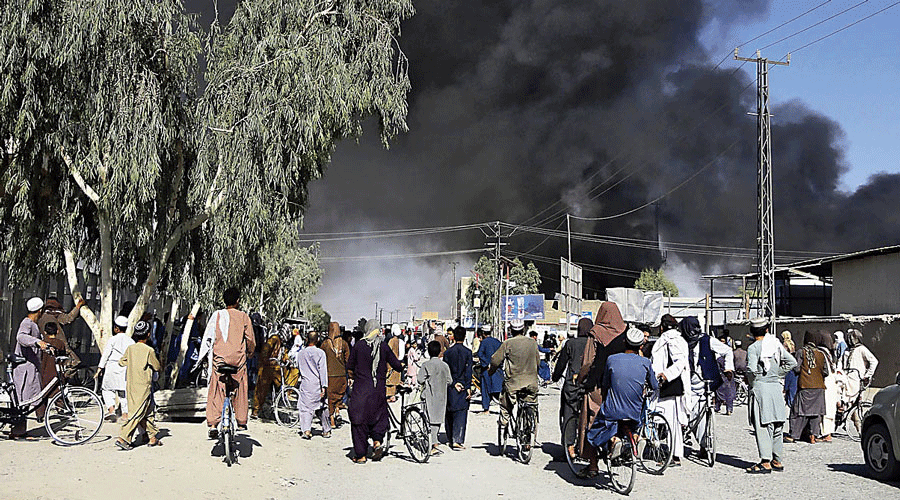The Taliban have captured Afghanistan’s second biggest city of Kandahar, officials said on Friday, fuelling fears the US-backed government could fall to the insurgents as international forces complete their withdrawal after 20 years of war.
The Taliban also captured the towns of Lashkar Gah in the south and Qala-e-Naw in the northwest, security officers said.
The Taliban claimed to have captured the third-largest city of Herat in the west after days of clashes there but Reuters was unable to confirm that.
Kandahar is the heartland of the Taliban, ethnic Pashtun fighters who emerged in the province in 1994 amid the chaos of civil war to sweep through most of the rest of the country over the next two years.
“Following heavy clashes late last night the Taliban took control of Kandahar city,” a government official told Reuters.
Government forces were still in control of Kandahar’s airport, which was the US military’s second biggest base in Afghanistan during their 20-year mission.
Lashkar Gah is the capital of the southern opium-growing province of Helmand, where British, US and other foreign forces battled the insurgents for years.
A police officer said officials and commanders had flown by helicopter out of the last government stronghold there at around midnight on Thursday and some 200 soldiers had surrendered to the Taliban after tribal elders intervened.
The fall of major cities was a sign that Afghans welcomed the Taliban, a spokesperson for the group said, according to Al Jazeera TV.
The speed of the offensive has sparked recriminations among many Afghans over President Joe Biden’s decision to withdraw US troops, 20 years after they ousted the Taliban in the wake of the September 11 attacks on the US.
Biden said this week he did not regret his decision, noting that Washington has spent more than $1 trillion in America's longest war and lost thousands of troops.
US Senate Republican leader Mitch McConnell said the exit strategy was sending the US “hurtling towards an even worse sequel to the humiliating fall of Saigon in 1975”, urging Biden to commit to providing more support to Afghan forces.
“Without it, al Qaida and the Taliban may celebrate the 20th anniversary of the September 11 attacks by burning down our Embassy in Kabul.”
The US state department said secretary of state Antony Blinken and defence secretary Lloyd Austin spoke to President Ashraf Ghani on Thursday and told him the US “remains invested in the security and stability of Afghanistan”. They also said the US was committed to supporting a political solution.
In response to the Taliban advances, the Pentagon said it would send about 3,000 extra troops within 48 hours to help evacuate US embassy staff.
Britain said it would deploy about 600 troops to help its citizens leave while other embassies and aid groups said they too were getting their people out.
The Taliban had until recent days focused their offensive on the north, a region they never fully controlled during their rule and the heartland of Northern Alliance forces who marched into Kabul with US support in 2001. On Thursday, the Taliban also seized the historic central city of Ghazni, 150km southwest of Kabul.
Security sources said Firuz Koh, capital of Ghor province, was handed over to the Taliban on Thursday night without a fight.
The government still holds the main city in the north — Mazar-i-Sharif — and Jalalabad, near the Pakistani border in the east, as well as Kabul.
On Wednesday, a US defence official cited US intelligence as saying the Taliban could isolate Kabul in 30 days and possibly take it within 90.
The UN has warned that a Taliban offensive reaching the capital would have a “catastrophic impact on civilians” but there is little hope for negotiations to end the fighting with the Taliban apparently set on a military victory.
In the deal struck with former US President Donald Trump’s administration last year, they agreed not to attack US-led foreign forces as they withdrew. They also made a commitment to discuss peace but meetings with government representatives have proved fruitless.
International envoys to Afghan negotiations in Qatar called for an accelerated peace process as a“matter of great urgency” and for a halt to attacks on cities.
A Taliban spokesman told Al Jazeera:“We will not close the door to the political track.”
Pakistani Prime Minister Imran Khan said this week the Taliban had refused to negotiate unless Ghani resigned from the presidency. Many people on both sides would view that as tantamount to the government's surrender, leaving little to discuss but terms.
Pakistan officially denies backing the Taliban but it has been an open secret that Taliban leaders live in Pakistan and recruit fighters from a network of religious schools in Pakistan.
Pakistan's military has long seen the Taliban as the best option to block the influence of arch rival India in Afghanistan and to neutralise Pashtun nationalism on both sides of a border that Afghanistan has never recognised.
Afghans, including many who have come of age enjoying freedoms since the Taliban were ousted, have vented their anger on social media, tagging posts #sanctionpakistan, but there has been little criticism from Western capitals of Pakistan's role.










